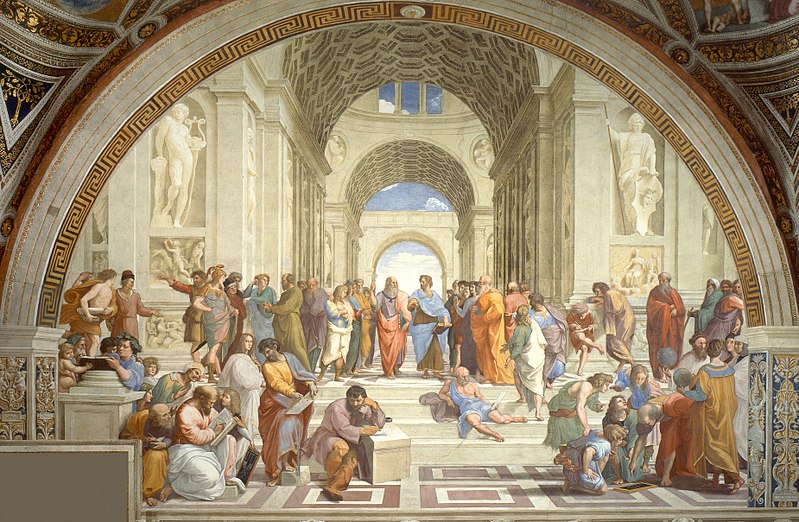University-Assisted Suicide

(Raphael's The School of Athens)
A crusade by humanities professors against Florida governor Rick Scott may be, contrary to their intentions, another sign of the suicide of American education. Scott has proposed lowering tuition rates for students majoring in STEM (science, technology, engineering, and math) subjects in order to bolster Florida’s economy. A petition begun by University of Florida professors labels this effort a “threat to the humanities” that would sacrifice education’s nobler purposes for mere job training.
This objection comes too late. For decades, a number of academics, Allan Bloom notably among them, have decried the 50-year dismantling of a required, common-core curriculum in the humanities, arguing that what makes higher education genuinely higher is its pursuit of two objectives that transcend job training. The first is civic education, which is indispensable because no nation can expect to be, in Jefferson’s words, “both ignorant and free.” The citizenry’s capacity for self-government is not a gift; it must relearned to be re-earned by every generation, which requires serious study of the moral, political, and philosophic foundations of our democratic republic.
Universities abdicated this crucial role 50 years ago. Few colleges require even one course in American government. The Department of Education finds only one-third of undergraduates today ever complete such a course. This is more than indifference; it is aversion. Carol Schneider, president of the Association of American colleges and Universities, finds “not just a neglect of but a resistance to college-level study of United States democratic principles.”
Important as educating for democratic freedom is, greater still is the second traditional objective of higher learning—cultivating the capacity for intellectual freedom. Not by accident, the word “liberal” in liberal education has the same root as the word liberty. Liberal education is an education for and through liberty. In line with Socrates’ reflection that the “unexamined life is not worth living,” universities had always regarded the highest liberty to consist of the freedom of the mind, that is, freedom from unexamined assumptions, for example, partisan politics and ideology. Liberty at its peak was therefore deemed identical with the pursuit of truth.
But, as Allan Bloom demonstrates in The Closing of the American Mind, the humanities today deny the possibility of intellectual liberty, because they are dominated by moral relativism, which denies the existence of absolute truth. “Relativism has extinguished the real motive of education, the search for a good life.” Bloom argues that the humanities—built on the logically untenable position that the only non-relative truth is that all truth is relative—reduce reasoning about the good life to what they deem more fundamental: the will to power in the service of race, class, and gender, thus replacing Socrates’ examined life with ideological conformism.
Students learn the new orthodoxy quickly. Fearing classroom humiliation, they keep any reservations to themselves, instead regurgitating on their exams their force-fed lessons. As a result, they learn little. The landmark national study, Academically Adrift, finds 36 percent of students show little to no increase in fundamental academic skills—critical thinking, complex reasoning, and clear writing—after four years in college. Their natural desire to know gives way to repeating whatever is required for a good grade.
And what good grades they get! Under the new student-teacher compact, professors award more A’s than ever in exchange for students’ acquiescence in the transformation of classrooms into ideological training camps. Fifty years ago, 15 percent of all college grades given were A’s. Today, an A is the most common grade (43 percent), despite the fact that, during the same period, average student study-time has fallen from 24 to 14 hours a week.
Surveying these intellectual badlands recalls the line from the old Soviet Union: “We pretend to work, and they pretend to pay us.” But higher education’s Berlin Wall was bound to fall, which is happening in Florida, and not only Florida. Although the petition focuses its ire on Scott, and although Texas governor Rick Perry‘s $10,000-degree proposal is similarly scorned, the professors’ real target is the American people themselves. A Pew Survey finds 57 percent of prospective college students deem a degree’s value no longer worth its cost. The people, not politicians, are leading the exodus from the sinking ship of the humanities, saying, “You no longer pretend to teach us about the nobler things—intellectual and democratic freedom—so, you may as well help us get a damn job. And, by the way, we place your worth at about $10,000.”
The irony is gagging thick. Having abandoned the possibility of free minds and devoted, instead, to prosecuting the injustice of free markets, the humanities now find themselves indicted by the very market ethos they seek to destroy. Everyday folks may not know much about Socrates and Plato, but their common sense declares, “Whatever these majors are selling, we’re not buying anymore.” More ironic, these humanities professors are defending a house they themselves vandalized long ago.
We who have been contesting the universities’ war on intellectual and political liberty take no solace in “I told you so,” for the loss is not theirs alone. Serving hemlock to genuine learning, the humanities have set democracy on the course toward barbarism.






